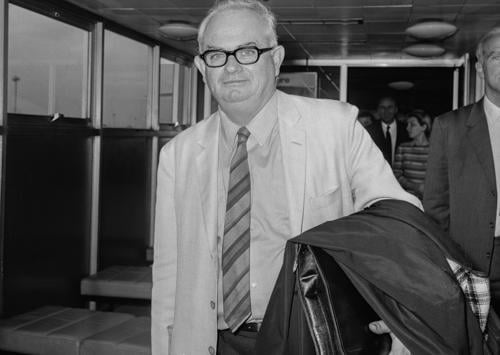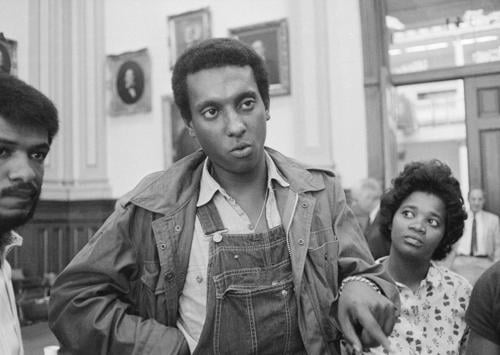Listen to New Voices on Studs Terkel our partnership with 826CHI-here! Read the Story
Showing 1 - 15 of 114 results
-
William Sloane Coffin and Jim Bowman discuss religion during the Vietnam War
William Sloane Coffin and Jim Bowman discuss history, religion, and the impact of the Vietnam War. Content Warning: This conversation includes racially and/or culturally derogatory language and/or negative depictions of Black and Indigenous people of color, women, and LGBTQI+ individuals. Rather than remove this content, we present it in the context of twentieth-century social history to acknowledge and learn from its impact and to inspire awareness and discussion.
-
Wilfred Burchett discusses about his career on journalism
Oct. 24, 1977 Wilfred Burchett (an Australian journalist) discusses his journalism career. He was reporting conflicts in Asia (North Korea, Vietnam, China and Japan) and their Communist supporters. He speaks briefly about his experiences in Nazi Germany and concentration camps. Towards the end of the interview he talks about his interest in learning and reporting more about the new euro-communism (prominent in Italy, Spain and France).
-
Wallace Terry reads from and discusses his book "Bloods: An Oral History of the Vietnam War by Black Veterans"
Sep. 26, 1984 Content Warning: This conversation includes racially and/or culturally derogatory language and/or negative depictions of Black and Indigenous people of color, women, and LGBTQI+ individuals. Rather than remove this content, we present it in the context of twentieth-century social history to acknowledge and learn from its impact and to inspire awareness and discussion. Wallace Terry felt it was an important mission to tell people about the Black men who fought in Vietnam. There are stories from 20 men.
-
Three Vietman War veterans, Robert Black, Robert Johnson, Dr. Gordon Livingston, and Steve Perriman discuss the war, part 2
Nov. 13, 1973 Robert Black, Robert Johnson, Dr. Gordon Livingston, and Steve Perriman talk about the Vietnam War. All three are officers in the military and veterans of the Vietnam War. They discuss their lives before and after the war and the contradiction and changes that came after seeing the horrors of the Vietnam War.
-
Three Vietman War veterans, Robert Black, Robert Johnson and Dr. Gordon Livingston, discuss the war, part 1
Nov. 12, 1970 Robert Black, Robert Johnson, and Dr. Gordon Livingston talk about the Vietnam War. All three are officers in the military and veterans of the Vietnam War. They talk about the Tet offensive and the Battle of Hue in 1968, and the deplorable treatment of the Vietnamese people by the United States military . Upon returning they have chosen to become anti-Vietnam War because it is not a struggle to stop Communism so much as being a force of destruction.
-
Thomas Hayes discusses his time ministering to deserters of the Vietnam War
Jan. 20, 1970 An Episcopal priest, Thomas Hayes, talks about the Vietnam War deserters who fled to Stockholm. Unlike Canada, Sweden offered asylum and publicly welcomed resisters. According to Thomas, the men who went to Stockholm worked jobs and some took classes. Thomas also explained that the deserters never put down those who were fighting in the war.
-
Thich Nhat Hanh discusses poetry and Vietnam
Apr. 21, 1971 In an interview with Studs Terkel, Buddhist monk, peace activist, and poet Thich Nhat Hanh. The conversation focuses on the devastating effects of the Vietnam War; they discuss the loss of culture and poetry in Vietnam, the anti-war protestors in America and Vietnam, and the sadness and resignation of the Vietnamese. Thich Nhat Hanh talks about America’s role in the war, and his experiences campaigning for peace in the United States and speaking with U.S. anti-war veterans.
-
Terkel comments and presents 1968 Democratic Convention documentary
1968 Terkel comments and presents 1968 Democratic Convention documentary. He is introduced by William F. Malloch, a composer at the Convention.
-
Studs visits the Illinois Institute of Technology to view student work about Vietnam
May. 24, 1970 Interviewing guests at the Institute of Design memorial in Crown Hall on the campus of the Illinois Institute of Technology. The student work on view is a collaboration between the Schools of Architecture and Planning, and the Institute of Design.
-
Studs Terkel is interviewed by Mitch Kraus and Edward Teller and Albert Szent-Gyorgy discuss science and politics
Dec. 29, 1970 Part 1 of this recording is Mitch Kraus interviewing Studs Terkel on his thoughts of self-indulgence, stereotypes, generational challenges, and historical events.
-
Studs Terkel interviews author-dramatist Frank Norman at his Bloomsbury Square Hotel ; part 1
1968 Terkel delves into the life of Frank Norman, a London ex-con who turned his life around and became a novelist and playwright by writing on his experiences. He wrote "Bang to Rights" shortly after his prison release which brought him great fame. He followed that with "The Monkey Pulled it's Hair" that had a U.S. release under the name "Don't Darling Me Darling". Norman opened up to Terkel discussing his illegitimacy, his illiteracy till age 14, his institutionalization in an orphanage which he turned into the novel "Banana Boy".
-
Studs Terkel discusses adults with young adults
1966 Discussing adults with young people. Subjects are: Ed Bocsel, age 16 Becky Milton, age 24 Chick Marmor, age 19 Stacy Goings, age 22 Danny Paul Yates, age 17 Paul Me, age 19 Jerry J., age 20 Lucky Miller, age 19 Lily, age 16 Topics include: Relationships with adults and family members, social alienation, religion, the Vietnam War, and the rise of corporate America overtaking local businesses.
-
Stokely Carmichael, Charlie Cobb, and Courtland Cox discuss the SNCC ; part 2
Jul. 23, 1965 Stokely Carmichael, Charlie Cobb, and Courtland Cox discuss civil rights and African Americans in politics. Discussing the philosophy of SNCC.
-
Stokely Carmichael, Charlie Cobb, and Courtland Cox discuss the SNCC ; part 1
Jul. 23, 1965 Stokely Carmichael, Charlie Cobb, and Courtland Cox discuss civil rights and African Americans in politics. Discussing the philosophy of SNCC.





